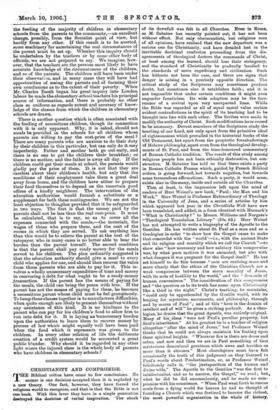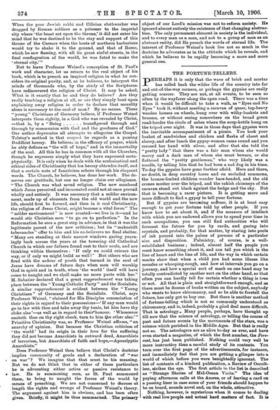CHRISTIANITY AND COMPROMISE..
THE Biblical critics have, come to few conclusions. No sooner is one decision accepted than it is exploded by a new theory. One fact, however, they have forced the religious world to recognise, and that is that the Bible is not one book. With this lever they have in a single generation destroyed the doctrine of verbal inspiration. The shock of its downfall was felt in all Churches. Even in Rome, as M. Sabatier has recently pointed out, it has not been without effect. Not only obscurantists, but religious men of all opinions, have realised that the new departure was a serious one for Christianity, and have dreaded lest in the inevitable doctrinal confusion proceeding from the dis- agreements of theological doctors the commands of Christ, at least among the learned, should lose their stringency, and the standard of Christianity be gradually levelled to the standards of mere expediency and civilisation. Such has hitherto not been the case, and there are signs that danger is arising in a precisely opposite direction. Tho critical study of the Scriptures may sometimes produce doubt, but sometimes also it establishes faith ; and it not impossible that under certain conditions it might even engender fanaticism. Its wide adoption may be the fore- runner of a revival upon very unexpected lines. While the Bible was regarded as all of equal moral value certain evident contradictions in the spirit of its teaching had to be brought into line with each other. The Scribes were made to modify the authority of Christ. Such modifications have ceased to be necessary. Devout searchers of the Scriptures study the teaching of our Lord, not only apart from the primitive ideal of righteousness which prevailed in the historical books of the Old Testament, but apart from the prophetic foreshadowings of Hebrew philosophy, apart even from the theological develop- ments of St. Paul, and from the time-honoured commentary of Roman Catholic tradition. The result of this study among religious people has not been ethically destructive, but con- structive. M. Sabatier has told us that there exists a party in Roman Catholic France which, guided by French Biblical critics; is going forward, not towards negation, but towards some tremendous affirmations. Such a party, it would seem, exists also in Germany, inside and outside all the Churches.
This, at least, is the impression left upon the mind of readers of Herr Weinel's new book, " Paul : the Man and his Work." Herr Weinel is Professor Extraordinary of Theology in the University of Jena, and a series of articles by him which appeared last year in the Christliche Welt have now been translated, and added, in a form identical with Harnack's "What is Christianity ? " to Messrs. Williams and Norgate's "Theological Translation Library" (10s. 6d.) Herr Weinel has not attempted tb write a biography of the Apostle to the Gentiles. He has written about St. Paul as a man and as a theologian in order "to show how the Gospel came to make that concordat with the world '—i.e., with the ancient State and. its religion and morality which we call the Church "—to show also "how necessary and how salutary this compromise was, by what pure motives it was animated, but also with what dangers it was pregnant for the Gospel itself." He has set himself to do this because "men are realising more and more clearly that the ethics of the Christian Church am a weak compromise between the stern morality of Jesus, with its note of hostility to the world," and the "demands of human convenience." The Consideration of this compromise and "the question as to its truth has come upon Christianity like a thief in the night." Christ's teaching, he maintains, "could only be apprehended by the Gentile world, with its longing for mysteries, sacraments, and philosophy, through and by means of Paul"; and of this "hero in the domain of intellect and of will" he gives a striking portrait. As a theo- logian, he denies that the great Apostle, was entirely. original. Many of his ideas "were not Paul's peculiar property, but Saurs inheritance." At his greatest he is a teacher of religion altogether "after the mind of Jesus," but Professor Weinel thinks that he could not always maintain his footing upon these spiritual heights. "Wherever fire is there are dross and ashes, and now and then we see in Paul something of that mysterious demoniacal greatness which awes and terrifies us more than it elevates." Most churchgoers must have felt occasionally the truth of this judgment as they listened to Paul's words about Predestination, or, as Professor Weinel felicitously calls it, "the juxtaposition of the human and divine wills." The Apostle to the Gentiles "was the first to intellectualise, and so to narrow, the Gospel," we read ; but, what he did he did unconsciously, and he made no com- promise with his conscience. "When Paul went forth to rescue souls from a dying world for heaven he had no thought of founding a. Church which was destined to become the richest, the most powerful organisation in the whole of history.
When the poor Jewish rabbi and Cilician clothworker was dragged by Roman Soldiers as a prisoner to the imperial city where'the beast sat upon the throne,' it did not enter his mind that he was destined to be the stay and support of this throne of the Caesars when the hosts of northern barbarians would try to shake it to the ground, and that of Rothe, which he saw flaming, with all its great sinful streets, in the • final conflagration of the world, be was fated to make the eternal city.'" But to leave Professor Weinel's conception of St. Paul's work and character, let us return to the real object of his book, which is to preach an inspired religion in what he con- siders its original purity, and, as he believes, to interpret the minds of thousands who, by the study of the Scriptures, have rediscovered the religion of Christ. It may be asked, What is it exactly that he and they do believe ? Are they really teaching a religion at all, or are they simply bent upon explaining away religion in order to declare that morality alone is necessary to the soul of man ? By no means. These "young" Christians of Germany believe, if Professor Weinel interprets them rightly, in a God who was revealed by Christ, —that is, by a "Being trmsfig,ured through and through by communion with God and the goodness of God." Our author deprecates all attempts to allegorise the Gospel. Tolstoy's method in that respea he regards as a passing Buddhist heresy. He believes in the efficacy of prayer, which he ably defines as "the will of hope," and in the immortality of the soul. All this be has in common with all the Churches, though he expresses simply what they have expressed meta- physically. It is only when he deals with the ecclesiastical and ethical sides of Christianity that his heresy obtrudes itself, and that a certain note of fanaticism echoes through his eloquent words. The Church, he believes, has done her work. She de- serves our gratitude, but can no longer chains our allegiance. "The Church was what saved religion. The new manhood which Jesus perceived and incarnated could not at once prevail wholly and entirely. It was necessary that a milder environ- ment, made up of elements from the old world and the new life, should first be formed, and then in it real Christianity, the religion of Jesus Christ, might become a vital force." The "milder environment" is now created—we live in it—and he would stir Christian men "to go on to perfection." In the Reformation he sees a great step in advance, in that it was the legitimate parent of the new criticism ; but its "makeshift tabernacles" offer to him and his co-believers no final shelter. "Many are standing at their narro* windows gazing yearn- ingly back across the years at the towering old Cathedral Church in which our fathers found rest to their souls, and are thinking within themselves : If only we could retrace the way, or if only we might build as well !' But others who are fired with the ardour of youth that burned in the soul of Jesus have dreams of future days when men will worship God in spirit and in truth, when the world' itself will have come to naught and we shall make no more pacts with her." M. Sabatier declared that a great rapprochement was taking place between the "Young Catholic Party" and the Socialists. A similar rapprochement is evident between the "Young Christians" of Germany and the Socialists. Christ, says Professor Weinel, "claimed for His Disciples renunciation of their rights in regard to their possessions= If any man would go to law with thee and take away thy tunic, let him have thy cloke also '—as well as in regard to their' honour. Whosoever smiteth thee on thy right cheek, turn to him he other also.' " Primitive Christianity was, so Professor Weinel affirms, "an anarchy of opinion. But because the Christian criticism of the world' had its origin in their love for the suffering they did not become Anarchists in outward deed, Anarchists of terrorism, but Anarchists of faith and hope,—Apocalyptic Anarchists."
Does Professor Weinel then believe that Christ's doctrine implies community of goods and a declaration of "war • on war"? We imagine that that must be his meaning. But we do not think that in either of these particulars he is advocating either active or passive resistance to • law. He is summoning men, as St. Paul summoned them, to bring to naught the forces of the world by means of preaching. We are not concerned to discuss at length the rights and wrongs of Professor Weinel's theory. The argument against him is obvious, and has been often given. Briefly, it might be thus summarised. . The primary object of our Lord's mission was not to reform society. He ignored almost entirely the existence of that changing abstrac- tion. The only permanent element in society is the individual, and to every man as a man, and not to a group of men as an abstract entity, did He preach the words of eternal life. The interest of Professor Weinel's book lies not so much in the doctrine he advocates as in the attitude which he reveals, and which he believes to be rapidly becoming a more and more general one.











































 Previous page
Previous page